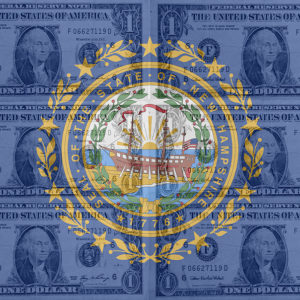None of the state aid from the massive $1.9 trillion COVID-19 relief spending package has gotten to the Granite State yet, but New Hampshire’s economy isn’t waiting around. On Tuesday, the state released the latest jobs numbers, showing unemployment fell from 3.6 percent to 3.3 percent in February, and far below its COVID-created peak of 16.3 percent last April.
While that’s still a full point higher than the 2.6 percent a year ago, New Hampshire’s unemployment is low by historic standards. It’s also lower than most of the nation. New Hampshire had the country’s 8th lowest unemployment rate in January, well below the national rate of 6.3 percent.
“Seasonally adjusted estimates for February 2021 placed the number of employed residents at 736,520, an increase of 720 from the previous month and a decrease of 14,290 from February 2020,” according to New Hampshire Employment Security. “The number of unemployed residents decreased by 2,190 over-the-month to 24,950. This was 4,780 more unemployed than in February 2020. From January 2021 to February 2021, the total labor force decreased by 1,470 to 761,470.”
Meanwhile, New Hampshire is on schedule to receive $1.54 billion in federal COVID money, despite having a budget running more than $100 million above revenue, falling unemployment, and a growing economy. Not that New Hampshire is alone. According to the U.S. Bureau of Labor Statistics, “unemployment rates were lower in January in 33 states and the District of Columbia and stable in 17 states” in January.
Nationally, revised numbers from the Commerce Department show the U.S. economy grew faster than previously reported during the third quarter of last year. The gross domestic product grew at a 2.1 percent annual rate, not the 1.5 percent originally reported.
And with more than $1 trillion of previously-allocated aid still unspent, critics of the Democrats’ $1.9 trillion spending splurge — the largest in U.S. history — are asking if the nation really needs to add nearly $2 trillion in red ink to the national ledger.
NHGOP Chair Steve Stepanek says Sununu and the Republicans should get the credit for the state’s above-average performance. “Under the collaborative leadership of Governor Chris Sununu and our Republican majorities, Granite Staters are reaping the benefits of a state government that looks to achieve results by placing our economic growth at the forefront of the agenda. The decrease in the state unemployment rate is a result of the progress we’ve made thus far, and we look forward to seeing continued benefits as a result of Republican efforts across the state in the coming years.”
Democrats, on the other hand, argue the need still exists. “New economic data shows #NH ‘s workforce decreased by over one thousand jobs from January to February,” noted 2020 Democratic gubernatorial candidate Dan Feltes on Twitter. “Many have given up filing for unemployment or have exhausted unemployment, which drives down the unemployment rate, but doesn’t mean workers are better off.”
Centrist Republican Senator Pat Toomey (R-Pa.) says the spending is obviously unnecessary based on the economic realities. “We are well past the point where our economy is collapsing. The last thing we need is a massive multi-trillion-dollar, universal spending bill.”
Some Democrats agree the bill’s record spending doesn’t match economic reality. “The question isn’t whether we need big stimulus,” Clinton administration Treasury Secretary Larry Summers told NPR’s Weekend Edition. “The question is, do we need the biggest stimulus in American history?”
In the past 12 months, the federal government has spent nearly $6 trillion — 34 percent more than the entire 2019 federal budget — responding to the COVID-19 crisis. Only one percent of the latest round of spending goes to vaccinations and less than 10 percent goes to direct COVID-19 relief.
As New Hampshire, Florida, Texas and other low-tax states continue to grow and the number of Americans vaccinated continues to climb, the question is whether this new debt will do more harm than good over the economic longterm — for both New Hampshire and the nation.





